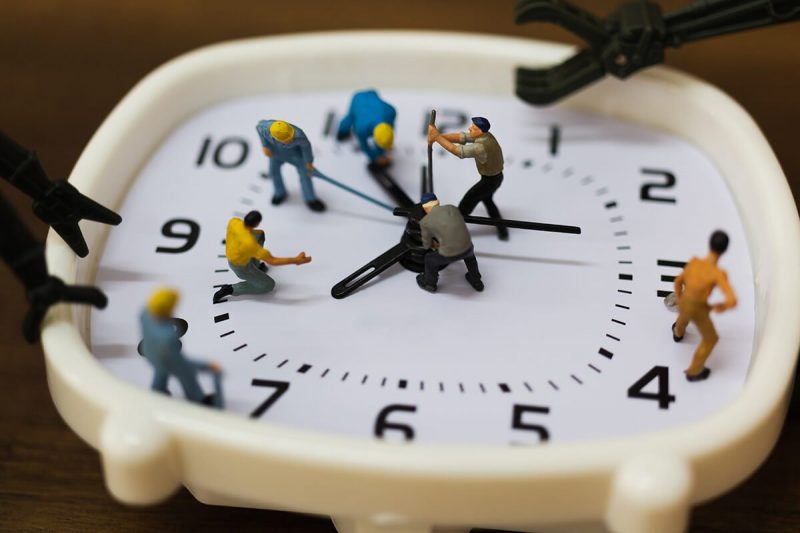TGS has written a tremendous article on how essential time-management is. And here’s the translation.
A lot of books tell us that we should do what’s interesting for us, turning our hobby into an income source and main business. A starting point (boring life, uninteresting environment) and a final point (making your life better, making you happy and so on) are described everywhere. But there’s nothing said about the difficulties you’ll have to overcome in order to get from point “A” to point “B”.
We have also tried to make a business out of our hobby. It all started in 2013 when I and 4 my friends decided to develop games. We spent approximately 6 months studying graphics, programming nuances, and so on. An idea occurred to us during the learning process. It seemed so huge and large-scale that it would take months and even years to realize it. And resources… big resources which we didn’t have. We decided that we should start from the simplest variant — an indie-game with many endings. We rented an office on the outskirts of our city as we tried to minimize expenses. The economy allowed us to get an experience of working “at all costs” and “in any circumstances”: we had to work on the project in an atmosphere unsuitable for it. So, searching for a project development catalyst, we faced several barriers.
Contents
First difficulties
• Inefficient time-management and absence of a structured work plan: teamwork in the office gave us more results than remote work. But the absence of schedule, clear division of responsibilities and tasks, tactical work plan, and strategy turned the process of game creation into a number of chaotic actions and it was difficult to foresee their results.
• Wrongly chosen and organized working place. We rented an office in a place meant for creative searches and that’s why a lack of personal concentration and self-discipline intensified because of many distracting factors.
• Lack of experience. It was our first serious project that we wanted to share with consumers. However, we couldn’t do in time everything we wanted and planned as we didn’t have enough development and working process organization skills.
Result: 1 game part + unfixed bugs.
Subjective metrics:
— 450 human-hours spent (the time spent by each team member).
— 50 models created.
— 9 sprites drawn.
— 17 animations made.
~ 35 scripts written.
Сhanges to better results
After having worked a month in such a regime, we realized that we wouldn’t finish the project successfully. We started to search for development possibilities and found out about Hackday (48-hour development marathon) and decided to take part in it. Being totally sure that we wouldn’t succeed, we started our preparation for the hackathon from developing an idea that we could realize in 48 hours. As a result, despite the absence of experience, we choose a variant of creating a mobile game.
It was quite challenging for us as we didn’t understand professional slang totally, were limited in time, environment, and existing rules. But it also inspired us. We created a working prototype in 48 hours — the “Clicker Bands” game. Having presented it to HackDay experts, we won in a “Startup” nomination.
Our success in the hackathon and the possibility to work in a coworking of one of the organizers allowed us to finish the game.
And now, when the product is ready, we have analyzed the factors which allowed us to complete a greater amount of work in a short period and come to the conclusion that the right time-management is the most efficient one.
Our conclusions about time management:
• According to the first Parkinson’s law, published in 1955, work consumes all the time you plan for it. There were extreme deadlines in the hackathon and we met them. So, the earlier is a deadline, the less time is left for procrastination.
• Checkpoint. Project managers met every day at a definite time and discussed the work results of their teams and developed plans for further actions. Such meetings have become a part of our schedule and allowed us to plan and structure our work.
Besides perfecting skills of time management, there’s another factor which helped us to finish the project — a competitive character of the event. Competition increased motivation and allowed us to find out our problems and use our advantages.
What did we get at the finish?
Moreover, a collective self-analysis allowed us to understand the pros of taking part in the hackathon and the way it affected the project realization.
• Motivation. Our victory in the HackDay allowed us to believe in ourselves and gave us the strength to finish our work.
• Acquaintances. Taking part in the event was also useful due to the educational part and professional help from the leading employees if Russian IT-companies.
• Support. As winners, we’ve got a free place in a coworking of one of the organizers.
• Coffee-maker. We not only realized our plans but also got a coffee-maker as a gift.
Due to the above-mentioned factors, we finished the game and published it in the Play Market.
Subjective metrics:
— 1050 human-hours.
— 169 sprites drawn.
— 95 animations made.
~ 76 scripts were written.
But it’s not the end. It’s the beginning of a large-scale work on project commercialization.





